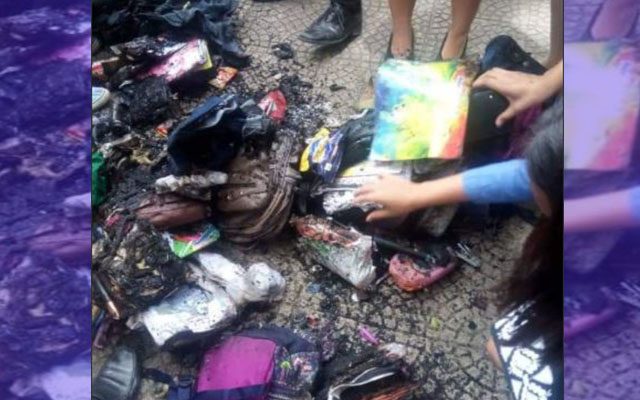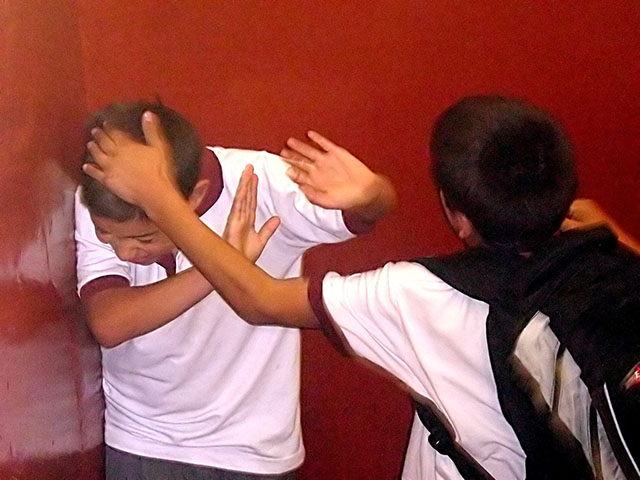
A private educational institution in Bicol is under fire for burning students’ possessions because they violated a “no-bag” policy implemented during an event.
The school administrator is also being condemned for shouting derogatory remarks to the students.
Videos of the incident were posted on social media and people called out the act which DepEd Bicol described as “child abuse and a violation of the child protection policy.”
It occurred in Bicol Central Academy last Friday, August 17 but pictures and videos have continued to circulate over the weekend.
Bags of students who have failed to comply the no-bag policy set for the school's event today have been confiscated and burned in the school quadrangle. The said bag contains school stuff, clothings, cp and laptops.
Sadly, the school involved is my alma mater.
SHAME. pic.twitter.com/D8ICip6ae0
— earl vincent (@Surrearlism) August 17, 2018
A school alumnus with the Twitter name Earl Vincent expressed his disappointment over the matter, saying that it was a “shame.”
He also included a video that was originally filmed by some of the students involved.
In an online interview with Interaksyon, Earl Vincent noted that the students who uploaded the video didn’t want their identities to be disclosed.
Moreover, he just not burned the bags of those students but he also called his students stupid. Sir, we had enough. This is not education at all. pic.twitter.com/XqD6vBnfqk
— earl vincent (@Surrearlism) August 17, 2018
Others decried the school administrator for initiating such an act.
Pinasunog ng mga titser at pamunuan ang mga bag, gamit, cellphone, at laptop ng mga estudyante ng Bicol Central Academy sa Camarines Sur bilang parusa dahil nilabag diumano ang "No Bag Policy". Ipa-drug test ang mga guro. Walang normal na tao gagawa nyan.
— Adrian Val Olonan (@AdrianValOlonan) August 19, 2018
The ‘no-bag’ policy
In a Twitter thread, school alumni Earl Vincent explained that the school administrator lashed out because he saw the students brought backpacks and large bags despite the “no-bag” policy. However, small bags are allowed.
The certain policy was implemented during the “Tatsumaki day” where some high school students were asked to substitute for teachers who were in a conference.
As such, they were required to come in formal attire. The administrator thought that large bags and backpacks would be unsightly with their outfits, hence the policy.
There were some students who had large bags during the event since they brought clothes for changing and devices such as a laptop to work on their school works after the event.
Policies violated by the school
DepEd Bicol noted that by burning the students’ possessions, the school committed child abuse and a violation of their Child Protection Policy.
RA 7610 or the “Special Protection of Child Against Abuse, Exploitation and Discrimination Act” protects children from experiencing maltreatment in some cases:
- Psychological and physical abuse, neglect, cruelty, sexual abuse and emotional maltreatment;
- Any act by deeds or words which debases, degrades or demeans the intrinsic worth and dignity of a child as a human being.
In the incident, the students’ possessions were burned without warning and they were called “stupid” by their administrator.
Meanwhile, DepEd’s “Child Protection Policy” states that children should be protected from abuse, violence, exploitation, discrimination, corporal punishment, bullying and other types of abuse in the school.
It was enacted to “protect the child from all forms of violence that may be inflicted by adults, persons in authority as well as their fellow students, including bullying.”

Advocacy organization Students’ Rights and Welfare Philippines noted that the incident also violated Article 32, Paragraph Six of the Civil Code of the Philippines. It notes:
Any public officer or employee, or any private individual, who directly or indirectly obstructs, defeats, violates or in any manner impedes or impairs any of the following rights and liberties of another person shall be liable to the latter for damages:
6) The right against deprivation of property without due process of law
However, being a private school, DepEd cannot immediately sanction Bicol Central Academy for their violations.
According to them, they can only initiate action once the accountability of the school administrator is established.
Meanwhile, the school may get its permit to operate revoked and be disqualified from participating in the Education Service Contracting and Senior High School Voucher Program. They may also face non-issuance of recommendation for tax exemption.
Legal counsel Joseph Noel Estrada noted that sensitive and controversial matters involving private schools undergo a different process than state-owned schools, citing that the country lives in a “litigious society.”
He wrote: “A contractual relationship is created between the students/parents and the schools where they all have obligations.”
“While these contractual relationships should not go beyond government scrutiny and regulation, such limitation should be reasonable and not one that impairs obligations and contracts.”
“As long as ‘fundamental fairness’ is observed in the private schools, and there is ‘color of due process,’ government intervention should be sparingly exercised.” — Photo and video from Earl Vincent via Twitter



